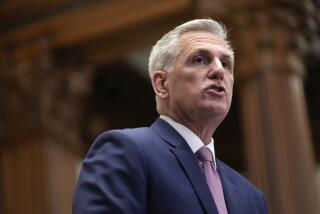The House : Dairy Supports : Deficit Reduction
An amendment to keep the federal dairy program within the confines of the Gramm-Rudman-Hollings deficit-reduction law was rejected by the House on a vote of 120 for and 267 against.
This cleared the way for House approval of a plan that cushions milk producers against the 4.3% cut in dairy price supports that took effect March 1 under Gramm-Rudman-Hollings. That cut lowered supports from $11.60 to $11.05 per hundredweight, thus reducing federal outlays by $80 million during the last seven months of this fiscal year.
A a result of the vote, the support remains at $11.60. The $80 million to cover the 55-cent differential comes not directly from taxpayers, but from a new assessment on dairy farmers.
Now that the first Gramm-Rudman-Hollings cuts have taken place, lawmakers are beginning to hear from those getting fewer federal benefits. This vote was the first of many tests the House will face on whether to keep Gramm-Rudman-Hollings intact or let it be eroded.
The new dairy provisions are among several changes made in the 1985 farm law by the pending bill (S 2143), which previously had cleared the Senate and was sent to President Reagan by the House.
Barney Frank (D-Mass.) who sponsored this amendment, said higher assessments on dairy farmers amount to an excise tax that will be passed through to consumers. He noted President ReaganŌĆÖs opposition to raising taxes to meet Gramm-Rudman-Hollings austerity goals.
Opponent Gerald Solomon (R-N.Y.) called FrankŌĆÖs amendment anti-consumer in that it would put small dairy farmers out of business and ŌĆ£put all these large consortiums throughout the United States in business.ŌĆØ
Members voting no wanted to exempt dairy farmers from the direct impact of Gramm-Rudman-Hollings, for at least the remainder of fiscal 1986.
How They Voted Yea Nay No vote Rep. Dreier (R) x Rep. Martinez (D) x Rep. Moorhead (R) x Rep. Roybal (D) x Rep. Torres (D) x
A package of spending cuts and revenue increases affecting a wide range of programs and aimed at reducing federal red ink by $18.1 billion during fiscal 1986-88 was passed by the House on a vote of 314 for and 86 against.
Savings of $13 billion would be achieved over the remaining seven months of fiscal 1986. The bill (HR 3128) was sent to conference with the Senate.
The legislation is a watered-down version of the $74-billion, three-year deficit-reduction measure that the House and Senate were unable to agree on last year, despite the mandate of their own budget resolution that they pass a reconciliation bill inflicting savings of that magnitude.
In upcoming months, lawmakers hope to achieve many of the savings that they bypassed last year in the interests of compromise. Such deficit-reduction steps must be made if Congress is to meet the austerity goals required by the new Gramm-Rudman-Hollings law.
While lawmakers touted HR 3128 for its impact on the deficit, they also used it as a vehicle for important policy changes. For example, the bill makes permanent the 16-cent-a-pack U.S. tax on cigarettes, changes Medicare payment formulas, provides additional federal help for tobacco farmers, and--over Administration objections--sets a new, more costly formula for sharing federal offshore oil revenues with coastal states.
Members voting yes favored the bill.
How They Voted Yea Nay No vote Rep. Dreier (R) x Rep. Martinez (D) x Rep. Moorhead (R) x Rep. Roybal (D) x Rep. Torres (D) x
More to Read
Get the L.A. Times Politics newsletter
Deeply reported insights into legislation, politics and policy from Sacramento, Washington and beyond. In your inbox three times per week.
You may occasionally receive promotional content from the Los Angeles Times.








